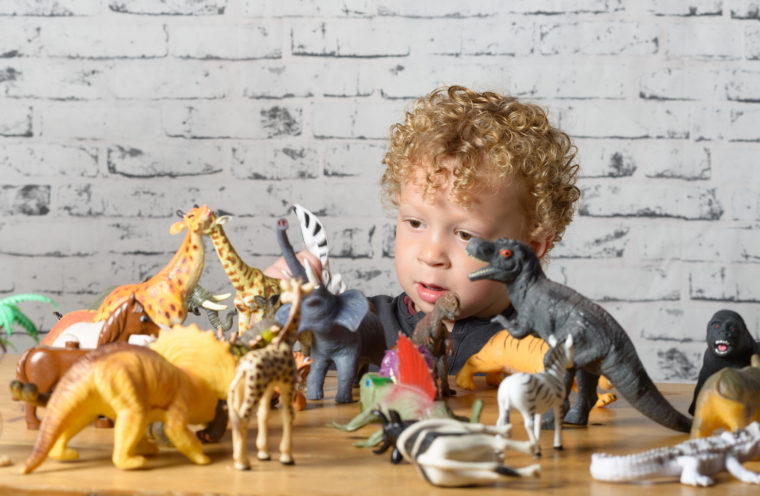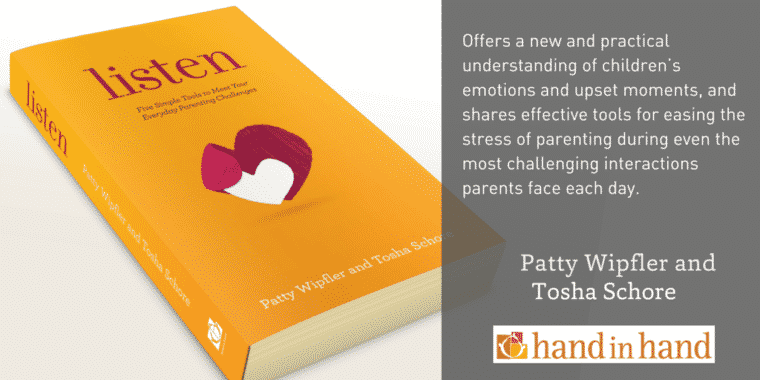 We were in this toy store and my son, who was three at the time, knew the rule: he was allowed to choose one toy at a time.
We were in this toy store and my son, who was three at the time, knew the rule: he was allowed to choose one toy at a time.
He looked around carefully, taking his time and then chose a toy stegosaurus. He made it crystal clear he would have liked a triceratops too but he knew the rule was one toy, so we left with the stegosaurus.
The day continued smoothly with a play in the park and a stop at our favorite ice-cream shop. And then, out of nowhere, the storm arrived:
“I want to go back to the store! I want the triceratops! They can have the stegosaurus back! I don't want it anymore!”
When I tried to explain that we couldn't return a toy he'd already played with things only got worse. He cried more and more and then started screaming and stomping his feet.
I kept calm in the beginning, but, soon after that, I felt flooded with feelings. I was frustrated at my own inability to soothe him. I perceived it at the time as a sign of my own incompetence. That brought me to the edge. Once those feelings erupted, my calm left me. I shouted at my son and hurried him to the car.
I felt terrible afterwards and as soon as we arrived home, I tried a clarification:
“I am sorry, Ovidiu, that I yelled earlier. I just want you to know that it was wrong of me to do that and that it is not your fault,” I told him, looking straight in the eyes.
“No problem, Mommy,” he answered. “Everybody makes mistakes sometimes, even Thomas the Engine!”
Despite not being an engine, I accepted his explanation and went to leave the room. Except that a little voice followed me:
“Only the moon is upset, mommy. And the stars. And the sun will be, too, in the morning.”
Argh! So the entire was universe was upset with me? From that moment I vowed to get my act together.
In my attempt to become a more educated parent, for whom moon, stars and sun might shine upon more favorably, I turned to Hand in Hand Parenting, and learned information about crying that was surprising, useful, and, perhaps most importantly, allowed me to react to his tears calmly.
Here are some of my discoveries:
- Crying is not a parental failure but a part of a child's recovery process. Our children cry in order to shed hurt feelings.
- Often children choose moments of extra-connection – happy times that help them feel safe and close to us – as opportunities to express old feelings of upset. Hand in Hand calls this the “Spoiled Outing Phenomenon.” All a child needs during these times is the caring and reassuring presence of an adult who listen to him.
- When a child cries his limbic system – the social and emotional center of his mind – is flooded with feelings so that communication between parts of the brain shuts down. In such situations, the brain's seat of reasoning, the prefrontal cortex, stops functioning properly and as a result the child cannot process advice and reasoning. The explanation I had tried to give could never be heard. My son was too busy working on recovery and couldn't process the information I tried to offer.
- Hand in Hand's founder, Patty Wipfler, explained why those cries sound so loud and desperate: “When you listen to your child’s upset, his feelings will become intense, last awhile and then evaporate. His limbic system heals fastest when it has his full concentration, and yours, on this feelings. Then, feelings ejected and connection made, it rights itself”.
As for my reaction to his upset? I was “Hitting the low road,” as Dr. Dan Siegel puts it in his book, Parenting from the Inside Out:
“When emotional reactions replace mindfulness, you are on the low road and it is very unlikely that you will be able to maintain nurturing connection and communication with your child. Having left over issues makes you vulnerable to entering the low road, especially under stressful conditions.”
So how do we hit the low road, and what is the high road, in the first place?
This is how Dr. Siegel explains these concepts:
What I should have done was to clearly restate the limit: “No, sweetheart, you cannot have the triceratops now, you may have it next week when we’ll revisit the shop, but not now.”
Then, I should have stayed close and attentive and listened to his upset, so he could have a chance to offload his feelings.
What prevented me were those feelings of incompetency I felt in the eyes of passersby witnessing my son’s tantrum. That weight triggered unresolved issues and unconscious memories I had about motherhood and ‘not being cut out for the job.'
“When you are feeling stressed or find yourself in situations with your child that trigger past unresolved issues, your mind may shut off and become inflexible,” Dr. Siegel says. However, “we are not destined to repeat the patterns of our past. Making sense of our lives enables us to build on positive experiences as we move beyond the limitations of our past and create a new way of living for ourselves and our children.”
Hand in Hand recommends the very effective tool Listening Partnerships to help achieve this goal.
With this information in mind, I feel better equipped at coping with tantrums. Every parent has limits, but now I understand why tantrums happen and I recognise when I'm headed for the low road and I have tools to help me through both. And I'm happy to report that most days my son seems to think the moon, the stars and the sun are happy.
Hand in Hand's Parent Club Community membership gives you the support you deserve in your parenting. Get your parenting questions answered by Instructors in weekly zoom support calls and a 24/7 coaching in a private discussion group. Learn how to get consistent results as you confidently use the Tools, creating more peace and cooperation in your home.

